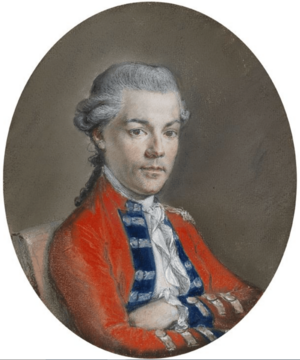Henry Luttrell, 2nd Earl of Carhampton facts for kids
Quick facts for kids
The Earl of Carhampton
|
|
|---|---|

Henry Lawes Luttrell
|
|
| Born | 7 August 1743 |
| Died | 25 April 1821 (aged 77) London |
| Allegiance | |
| Service/ |
|
| Years of service | 1757–1798 |
| Rank | General |
| Commands held | Ireland |
| Battles/wars | Seven Years' War United Irishmen Rebellion |
General Henry Lawes Luttrell, 2nd Earl of Carhampton PC (7 August 1743 – 25 April 1821) was an important Anglo-Irish politician and soldier. He was known for his long career in public service. Luttrell served in the British Army and held a seat in Parliament for many years. His life was marked by his involvement in major historical events. These included military conflicts and political debates.
Contents
Early Life and Military Career
Henry Luttrell was born into a well-known Anglo-Irish family. His ancestors had lived in County Dublin since the 13th century. His grandfather, Henry Luttrell, was a military commander. Henry's father, Simon Luttrell, held several noble titles in Ireland. His mother, Maria, inherited a large estate in Jamaica. This estate later passed to Henry.
Henry went to Westminster School and Christ Church, Oxford. In 1757, he joined the 48th Regiment of Foot as an officer. Two years later, he became a lieutenant in the 34th Regiment of Foot.
Luttrell gained a reputation for being brave during the Seven Years' War. He became an important officer for the British forces in Portugal. In 1768, he was elected as a Tory Member of Parliament for Bossiney, a village in Cornwall.
Political Challenges and Service
In 1769, Luttrell ran for Parliament in Middlesex. He ran against John Wilkes, a very popular reformer. Luttrell lost the public vote by a large margin. However, he was still given the seat in Parliament. This happened because Wilkes had been legally prevented from taking his seat. This event made Luttrell very unpopular with many people.
Despite this, the government rewarded Luttrell. In 1770, he was made Adjutant General for Ireland. He continued to serve in the House of Commons. There, he often spoke against those who opposed the government's actions. He believed they were harming the country.
Role in Irish Affairs
Luttrell became more involved in Irish politics. From 1783 to 1787, he was a Member of the Irish House of Commons. He represented Old Leighlin. When his father died in 1787, Henry inherited the title of Earl of Carhampton. He also became a Colonel of the 6th Dragoon Guards. He was also made Lieutenant-General of the Ordnance in Ireland.
In 1790, he returned to the British Parliament. He became the Member for Plympton Erle.
Military Command in Ireland
In 1795, Carhampton was given a major task. He was to break up and disarm groups of Defenders in Connacht. These groups were involved in local unrest. His actions led to about 1,300 "rebels" being forced into the British navy. This caused some disagreement even among those loyal to the Crown.
In 1796, leaders of the Society of United Irishmen were planning a rebellion. They hoped for help from France. Carhampton was then put in charge of all Crown forces in Ireland. He worked to bring peace to the country. He also helped to stop the rebellion that broke out in the summer of 1798. His methods were seen as very firm by his critics.
Later Political Views
Henry Luttrell held strong views on several political issues. In the early 1790s, he voted against bills that aimed to end the slave trade. He believed that ending slavery would lead to problems. He also opposed giving more rights to Roman Catholics. He spoke out against changes to how Parliament worked.
In 1799, he sold his property in Ireland. He later said he did not take part in the Acts of Union. This was the law that joined the parliaments of Great Britain and Ireland. He felt that Ireland was becoming too Catholic and decided to leave.
Luttrell bought an estate in Painshill Park in Surrey, England. He lived there quietly for several years. In 1813, he began to argue with the government. He claimed that King George III had promised him a secure seat in Parliament. In June 1817, at nearly 80 years old, Luttrell returned to Parliament. He became the Member for Ludgershall. For his last four years, he often voted with the opposition parties. However, he did not support all their ideas. For example, he did not vote for parliamentary reform in 1819. After the Peterloo Massacre, he supported the government's use of force. He believed it was necessary against those causing unrest.
Family Life
Henry Luttrell had a brief marriage to Elizabeth Mullen in 1759. They had a daughter named Harriet Luttrell. This marriage was later cancelled.
In June 1776, he married Jane Boyd. They did not have any children. His brother, John, inherited his titles after his death.
Henry Luttrell also had an illegitimate son, Henry Luttrell (1765-1851). This son became known for his witty writing and social charm. He had very different interests from his father. He was a friend of Thomas Moore, a famous Irish poet. He was also close to leading Whig politicians.
 | John T. Biggers |
 | Thomas Blackshear |
 | Mark Bradford |
 | Beverly Buchanan |

